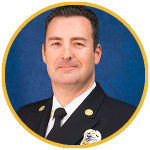Getting back to nature with camping means leaving behind some familiar conveniences and using some unfamiliar procedures. To make sure a camping trip is an enjoyable one, be sure to follow safety rules.
Campfire Safety
When preparing a campfire, a site should be chosen that is away from grass, trees and tents. An area 10 feet around the campfire should be cleared of any ground litter, twigs, leaves, or organic material. Clear the area down to the bare soil. The site should be downwind from the sleeping area to prevent a spark or ember igniting tents, sleeping bags, etc.

Weather and Forest Conditions
If weather conditions are dry and warm resist building a fire unless necessary. A small spark is all it takes to ignite dry grass and leaves. Be sure to pay close attention to forest conditions and warnings from the park service.
- Rocks should be placed directly around the campfire pit.
- Never use gasoline to light a fire, it is extremely explosive. Keep a pail of sand or water nearby in the event it is needed to control the fire or extinguish it.
- Wear tightfitting cotton or wool clothing while working near the campfire.
- Always keep a careful eye on fires. Make sure children don’t play near them. Before you go to sleep at night or if you leave the campsite for a while, be sure to extinguish the fire completely. Many forest fires are started each year from unattended campfires or those that were not completely extinguished. Douse the fire with water or sand, break up the coals, add more water or sand, stir it with a stick and cover the dead embers with dirt.
- Some tents are manufactured from cotton, which is a flammable substance. According to the U.S. Consumer Product Safety Commission in some cases the fabric treatment used to make tents waterproof actually increases the flammability. Buy a tent that is flame retardant. Remember, “flame retardant” doesn’t mean fire-proof. A flying ember from a fire can land on the tent and ignite it in seconds. There are other things in a tent that can burn such as sleeping bags, clothing and people. A tent should be placed upwind from any campfire or outside cooking and lighting devices. Create at least a three- foot clearing around the tent and use battery operated lights near and inside the tent.
- Always refuel any heat-producing appliance, such as lanterns and stoves, outside at a safe distance away from tents, fires, and other things easily ignitable.
- Always store flammable liquids, such as gasoline, outside a tent, away from children, and away from any heat source.
Trailer Safety
When traveling with a camper trailer or recreational vehicle (R.V.), use only electrically-operated or battery-operated lights inside. Maintain all
appliances in a safe working condition and check them before use. Keep a fire extinguisher on board, an ABC type able to put out multi-source
fires. Mount a smoke detector inside the vehicle.
When the vehicle is traveling, shut down gas to appliances and water heaters by closing the fuel supply at the gas bottle. Never operate combustion type or catalytic heaters inside closed campers or R.V.s, this could result in asphyxiation from either fumes or oxygen depletion. Don’t cook while the vehicle is underway, a sudden lurching of the vehicle could result in spilling of cooking grease, causing a fire or burn. Always refill fuel stoves or lanterns outside campers or R.V.s. Accumulation of vapors in the fueling process could result in an explosion. Avoid accumulating or storing of combustibles such as newspapers and grocery bags in your vehicle.

Boating Safety
There are thousands of recreational boating accidents per year. Contributing factors to these accidents include traveling too fast for water or weather conditions, driving under the influence of drugs/alcohol, failing to follow boating rules and regulations, carelessness, and inexperience.

There are thousands of recreational boating accidents per year. Contributing factors to these accidents include traveling too fast for water or weather conditions, driving under the influence of drugs/alcohol, failing to follow boating rules and regulations, carelessness, and inexperience.
To prevent boating accidents, we offer these safety suggestions:
- Check weather forecasts before heading out.
- Let someone know where you’re going and when you expect to return.
- Check engine, fuel, electrical, steering systems, and especially exhaust-system leaks.
- Carry at least one fire extinguisher. Match it to the size and type of boat. Store in a readily accessible place & in a condition for immediate use.
- Equip your vessel with required navigation lights and a whistle, horn or bell to attract attention.
- Consider additional safety devices, such as a paddle or oars, a first-aid kit, a supply of fresh water, a tool kit, spare parts, a flashlight, flares, and a radio.
Care & Protection of crew and guests
- Provide every person on board a life-jacket and require they be worn.
- Know and obey marine traffic laws; “Rules-of-the-Road” and memorize the various distress signals.
- Keep an alert lookout for other watercraft, swimmers, floating debris, and shallow waters.
- Pay attention to loading, be sure not to overload. Try and distribute the weight evenly;
- Do not stand up or shift the weight suddenly in a small boat.
- Do not permit riding on the bow, seatbacks, or gunwales of the boat.
- Do not operate a boat while under the influence of alcohol or drugs.

